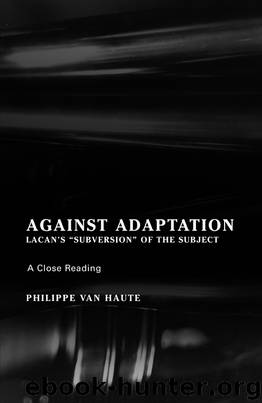Against Adaptation by Philippe Van Haute

Author:Philippe Van Haute [Haute, Philippe Van]
Language: eng
Format: epub
ISBN: 978-1-59051-620-1
Publisher: Other Press
Published: 2012-12-03T16:00:00+00:00
THE OBJECT a AND LACAN’S CRITIQUE OF THE PSYCHOANALYTIC TRADITION
Of course, all this does not prevent the neurotic patient from continuing to interpret the object of the phantasy as the object of a demand, and in fact, the neurotic does believe that the lost object can be recovered. Here we might think of the example of analysands that repeatedly demand a conclusive explanation for their suffering. We might also think of analysands who say repeatedly that their parents denied or deprived them of something in one way or another (love, understanding, the possibility of studying a certain subject), and so made their life unbearable or caused it to fail. Or again, there are analysands who sacrifice their lives in order to make their mother or father happy—nothing is too much to keep their parents content—and the failure of this project sometimes goes together with a leaden feeling of guilt, which makes their lives impossible. These analysands somehow make themselves the object that can bring the desire of the Other to fulfillment. A last example: an analysand dreams again and again that she has a penis, and all the while she is locked into a deadly struggle with men, who “should not believe that everything is permitted to them just because they have one.” In her phantasy she interprets the male organ as an object that she could also have possessed;44 it is a great injustice to her that she has been deprived of this organ, to which she ascribes great power. In other words, she understands her neurotic suffering in terms of an object that has been taken from her, and which she untiringly claims back.
All these examples share the fact that the object of the desire is interpreted as the articulable object of a demand. It is as if the neurotic shrinks back before the radicality of the lack; she cannot accept that the loss of the object cannot be remedied, or, more precisely, she cannot bear the ultimate indeterminacy and indeterminability of the desire of the Other. She defends herself with the object of the phantasy by reinterpreting the object of the phantasy according to the logic of the unconditional demand. In this way, the lack continues to exist, but it acquires a purely factical character. The neurotic can only accept the lack to the extent that she can also believe that it can in principle be remedied.45
According to Lacan, this last point means that the neurotic understands her suffering in terms of frustration—she has been denied or deprived of something that she should have (and could have) had in order to lead a successful life. The neurotic patient elevates this frustration to the status of the truth of her existence and her desire. She hopes that the analysis can help her to remedy this frustration, which is to say, help her find the object that she believes can put an end to her suffering. And as we already know, the neurotic is not alone in this. Earlier
Download
This site does not store any files on its server. We only index and link to content provided by other sites. Please contact the content providers to delete copyright contents if any and email us, we'll remove relevant links or contents immediately.
The Art of Thinking Clearly by Rolf Dobelli(8843)
The 5 Love Languages: The Secret to Love That Lasts by Gary Chapman(8499)
Mindhunter: Inside the FBI's Elite Serial Crime Unit by John E. Douglas & Mark Olshaker(7834)
Becoming Supernatural by Dr. Joe Dispenza(7107)
The Road Less Traveled by M. Scott Peck(6635)
Nudge - Improving Decisions about Health, Wealth, and Happiness by Thaler Sunstein(6633)
Enlightenment Now: The Case for Reason, Science, Humanism, and Progress by Steven Pinker(6406)
Win Bigly by Scott Adams(6312)
Mastermind: How to Think Like Sherlock Holmes by Maria Konnikova(6236)
The Way of Zen by Alan W. Watts(5800)
Factfulness: Ten Reasons We're Wrong About the World – and Why Things Are Better Than You Think by Hans Rosling(4022)
The State of Affairs by Esther Perel(3931)
Gerald's Game by Stephen King(3918)
Man's Search for Meaning by Viktor Frankl(3634)
The Confidence Code by Katty Kay(3566)
Thinking in Bets by Annie Duke(3533)
The Worm at the Core by Sheldon Solomon(2918)
Enlightenment Now by Steven Pinker(2917)
Liar's Poker by Michael Lewis(2812)
